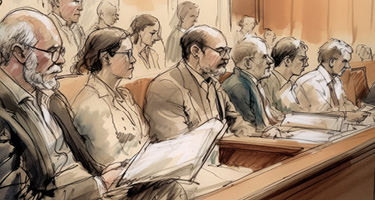Corporate Law & Commercial Litigation
Key Developments and Trends in U.S. Commercial Litigation
by Justin Smulison
Whether it's multibillion-dollar water cleanliness verdicts or college athletes vying for the right to compensation, the state of litigation remains strong.
Read Full Article

IN PARTNERSHIP
Taking an Important Case to Trial: Jury Research
by Steven F. Molo and Sara Margolis
MoloLamken LLP partners Steven Molo and Sara Margolis discuss a critical step in preparing for high-stakes trials: jury research.

Will Recent Boeing Settlements Create Tailwinds In Corporate Law?
by Justin Smulison
Prominent litigation against Boeing is setting a precedent of accountability, professionalism and commitment among company boards as well as ushering ESG further into the courtroom to help monitor and prevent safety issues.

Recognized Lawyers
Refine results by using the search bar or filters within each column.


Featured "Lawyer of the Year" Honorees
Kendall Coffey is a founding member of the law firm Coffey Burlington, PL, based in Miami, which handles matters in Florida and throughout the United States. Mr. Coffey also currently serves as the Chair of the Federal Judicial Nominating Commission for South Florida. Appointed by both of Florida's United States Senators, he presides over the 21-person commission that selects individuals to be considered by the White House to become U.S. federal judges and U.S. Attorney for South Florida. Mr....
Featured in Best Lawyers
A native of Coral Gables, Andy Marks joined Coffey Burlington in 2013 as a partner after more than 25 years of practice as a litigation partner in the Washington, DC firm of Crowell & Moring LLP. Andy also maintains a practice in Washington as the Law Offices of Andrew Marks PLLC. Following graduation from the University of Michigan Law School, Andy clerked for U.S. District Judge Charles R. Richey in the District of Columbia and also served as Executive Assistant to Ambassador Sol M. Lin...
Kevin Kaplan joined the firm in 1992, and now serves as its President. He has extensive trial and appellate court experience in commercial litigation. As trial counsel for corporations and entrepreneurs, Mr. Kaplan has litigated matters ranging from aircraft finance, banking and partnership disputes, to trademark and copyright, construction defect and contract claims. He approaches his cases by seeking creative and cost-effective trial strategies for complicated problems.
Robert Burlington is Managing Member and co-founder of the firm. In his more than 35 years of practice, he has litigated and tried to completion a wide variety of jury and non-jury trials in state and federal courts. He has served as lead counsel in multiple arbitrations. These cases include business torts, commercial and real estate contract disputes, securities transactions, class actions, as well as many aspects of state and federal employment litigation. He has built his practice by assis...
Michael J. Payne is a partner at Frankel, Rubin, Klein, Payne & Pudlowski, P.C. and focuses his practice on estate planning, fiduciary litigation and civil litigation. He counsels individuals, couples, families and small business owners in creating an estate plan that is specifically tailored to their individualized needs. His passion for estate planning is evident in his approach of collaborating with clients to solve their most important personal, legal and business planning decisions. ...
Wade McClure, a Partner of the Firm in the Dallas office, primarily represents companies and individuals in complex commercial litigation, including business divorce cases, fiduciary duty litigation and fraud litigation. Wade also works on matters involving claims of minority shareholder oppression, investment fraud, and oil and gas disputes. Over the past thirty years, Wade has also represented manufacturers in products liability matters throughout Texas and the Southwest. Wade is a seasoned...



















